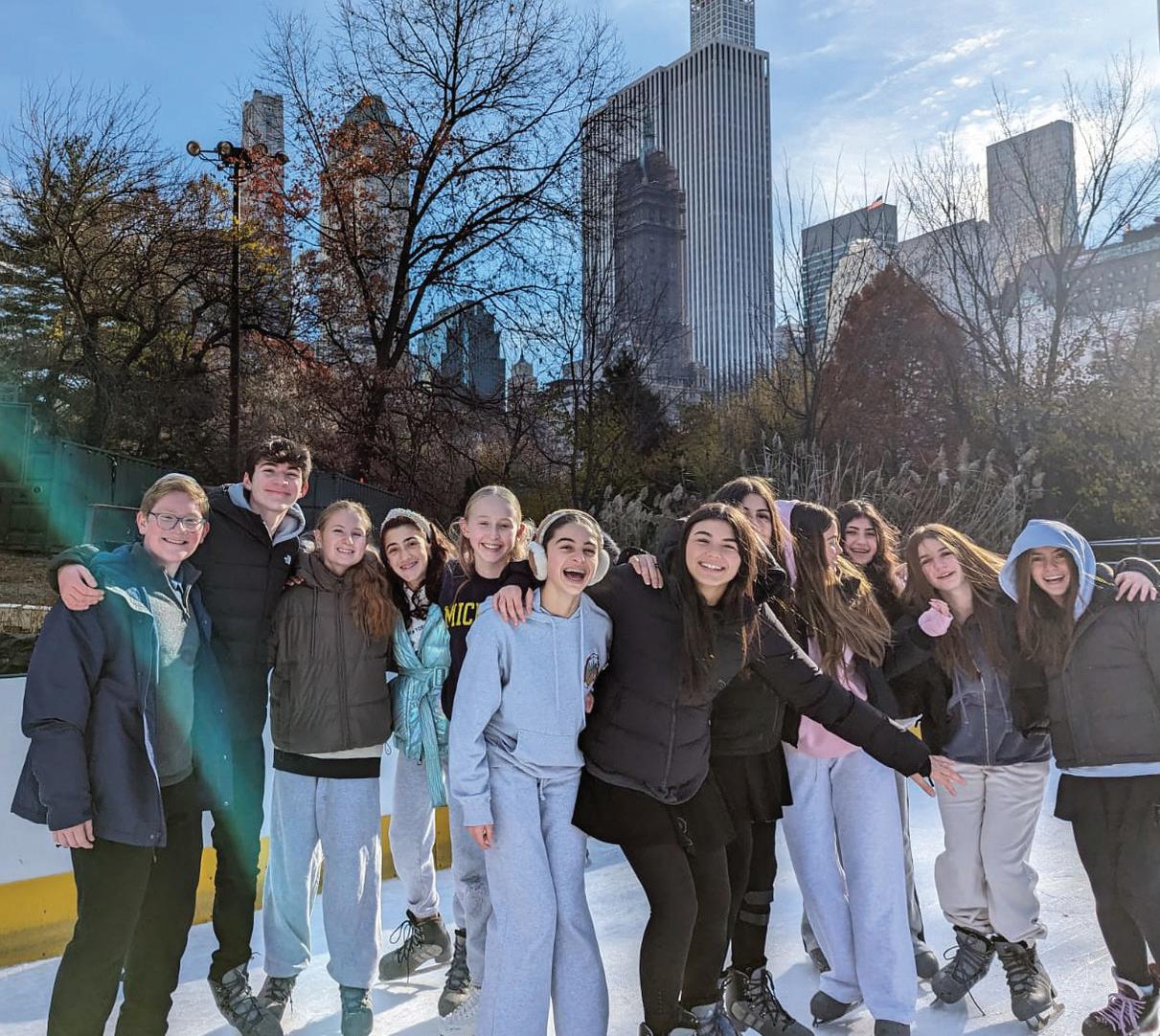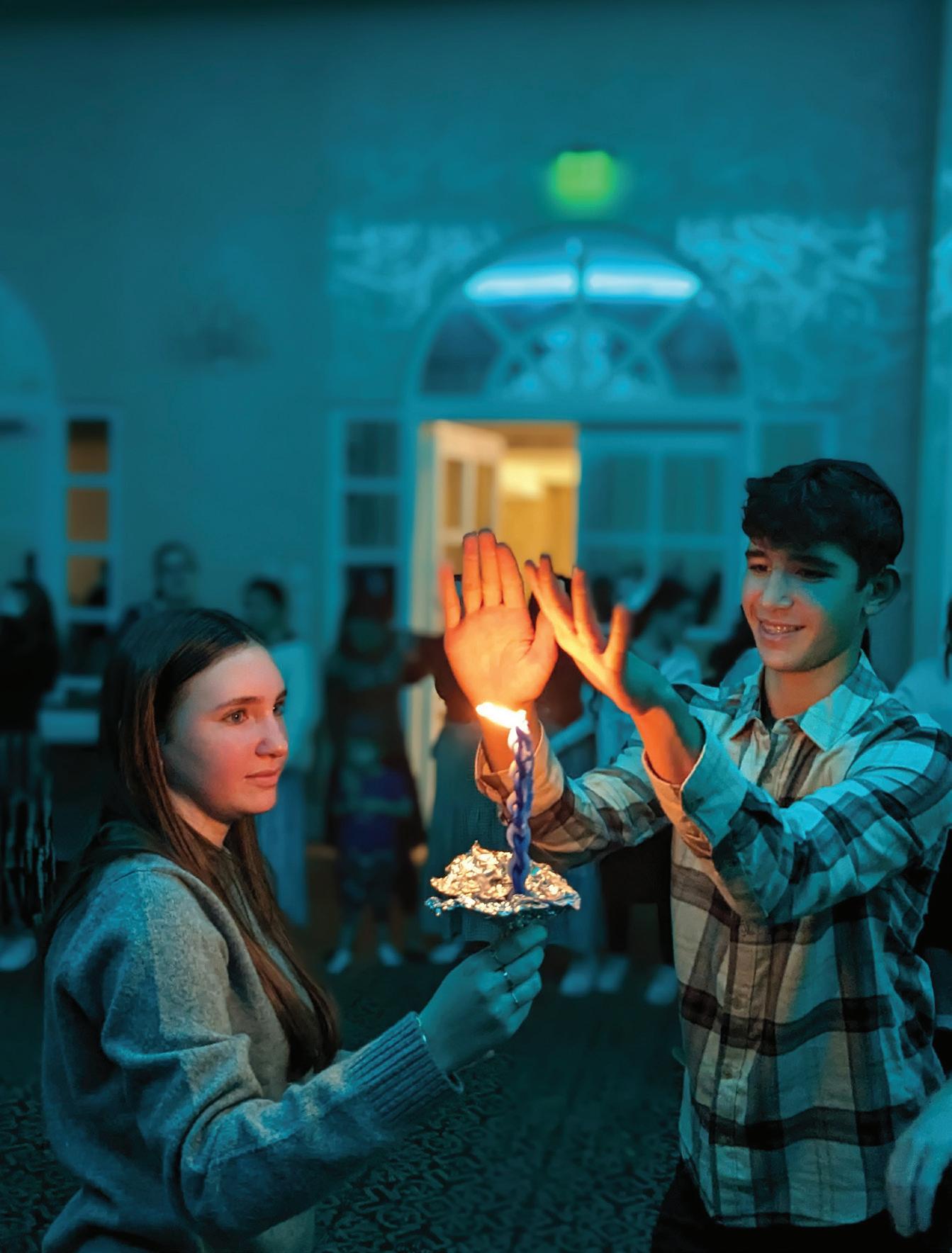






GUIDE
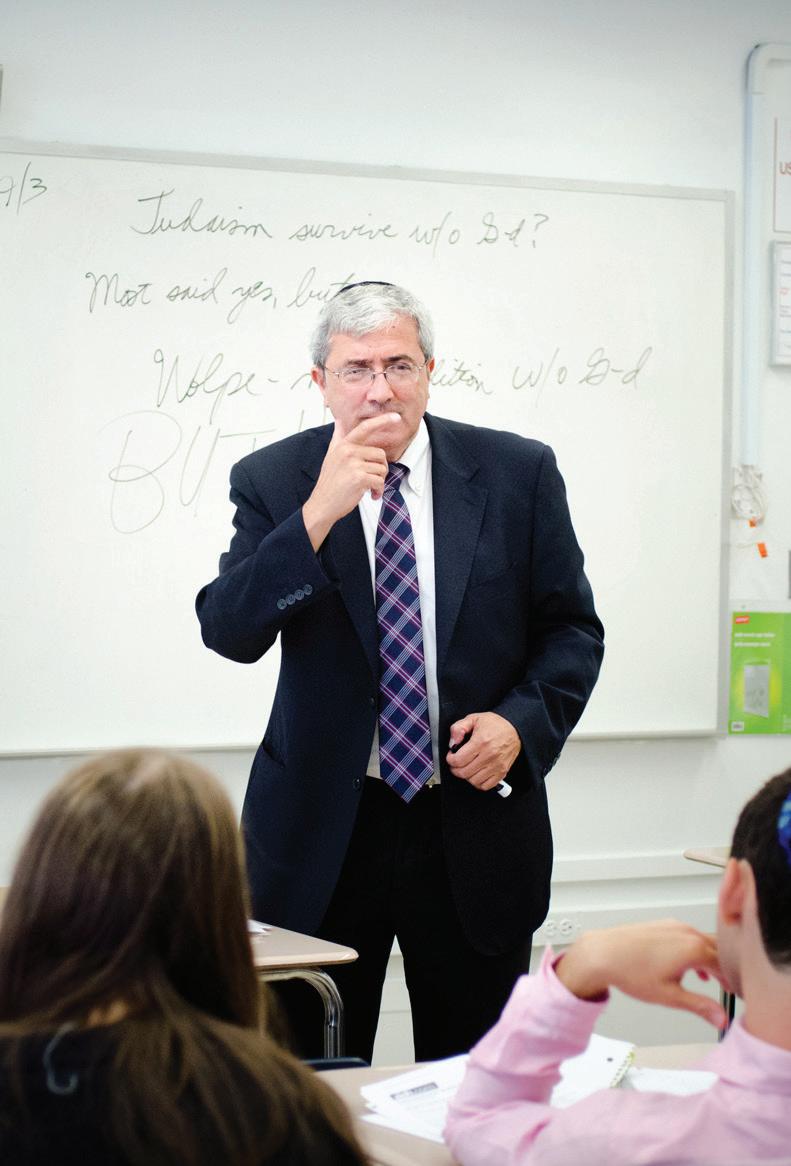
A. Freshman through Junior Years
JUDAIC STUDIES
6. Talmud Department
7. Tanakh Department
8. Jewish Life and Thought Department
9. Hebrew Language Department
GENERAL STUDIES
11. English Department
12. History Department
13. Mathematics Department
14. Science Department
15. World Languages Department
16. Music Department
16. Art Department
18. Art Department
18. English Department
19. Hebrew Language Department
19. History Department
21. Jewish Life and Thought Department
22. Mathematics Department
23. Science Department
24. Talmud Department
24. Tanakh Department
25. TEC Department
25. World Languages Department
As a co‑educational, Modern Orthodox Day School, Ramaz strives to educate students toward the following goals:
• A commitment to menschlichkeit, reflecting fineness of character, respect for others, integrity, and the centrality of chesed in all its manifestations
• A commitment to Torah, mitzvot, Ahavat Yisrael, and love and support for the State of Israel
• A commitment to the pursuit of knowledge, intellectual rigor, scholarship, and a lifelong love of learning
• Loyalty and gratitude to the United States of America, and the democratic traditions and values of our country
• A sense of responsibility for the Jewish people and all humankind
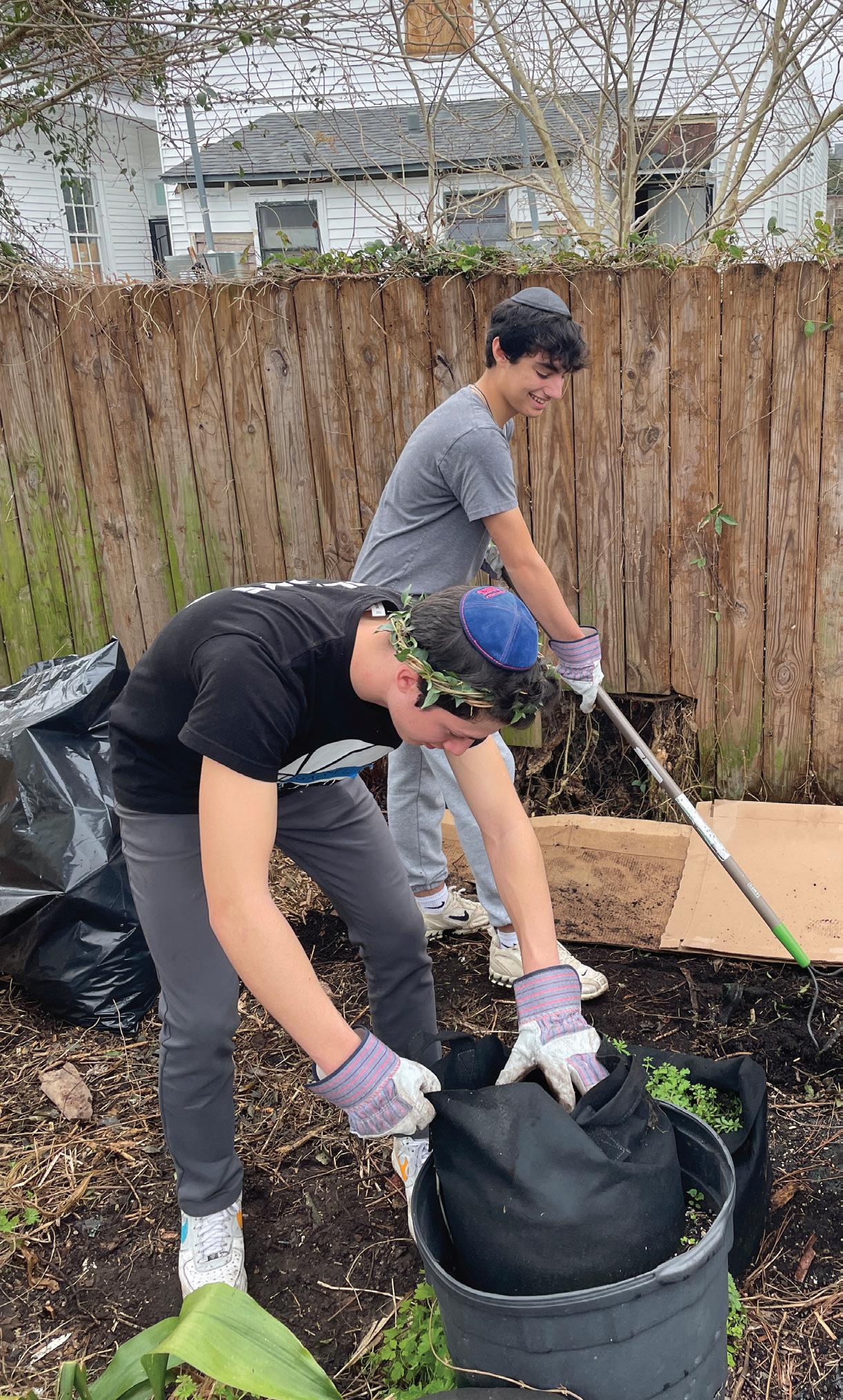
Ramaz has always been an institution well known for its academic excellence. That pillar stands because of the world class faculty, the rigorous and thoughtful curriculum, and the intellectual drive and curiosity of the student body. Those three components have remained steadfast throughout the history and evolution of the Ramaz education.
The Ramaz curriculum is acknowledged by generations of alumni as an outstanding preparation for college, post high school Jewish learning, and their careers. The dual curriculum, and cross disciplinary nature of the courses, provides a unique bi cultural perspective on problem solving and analytic methods.
This guide was compiled in order to outline the academic courses offered at Ramaz, both in general and judaic studies. The first section describes the courses offered in the freshman, sophomore, and junior years. That is followed by the courses and electives offered in the senior year, during which specialized Judaic and general courses are taken, along with mini courses offered in the spring semester.
In every subject, in addition to the in classroom curriculum described, students enhance their studies by hearing lectures from local experts and guest speakers, and exploring the complimentary exhibits, historical monuments, and cultural offerings around New York City.
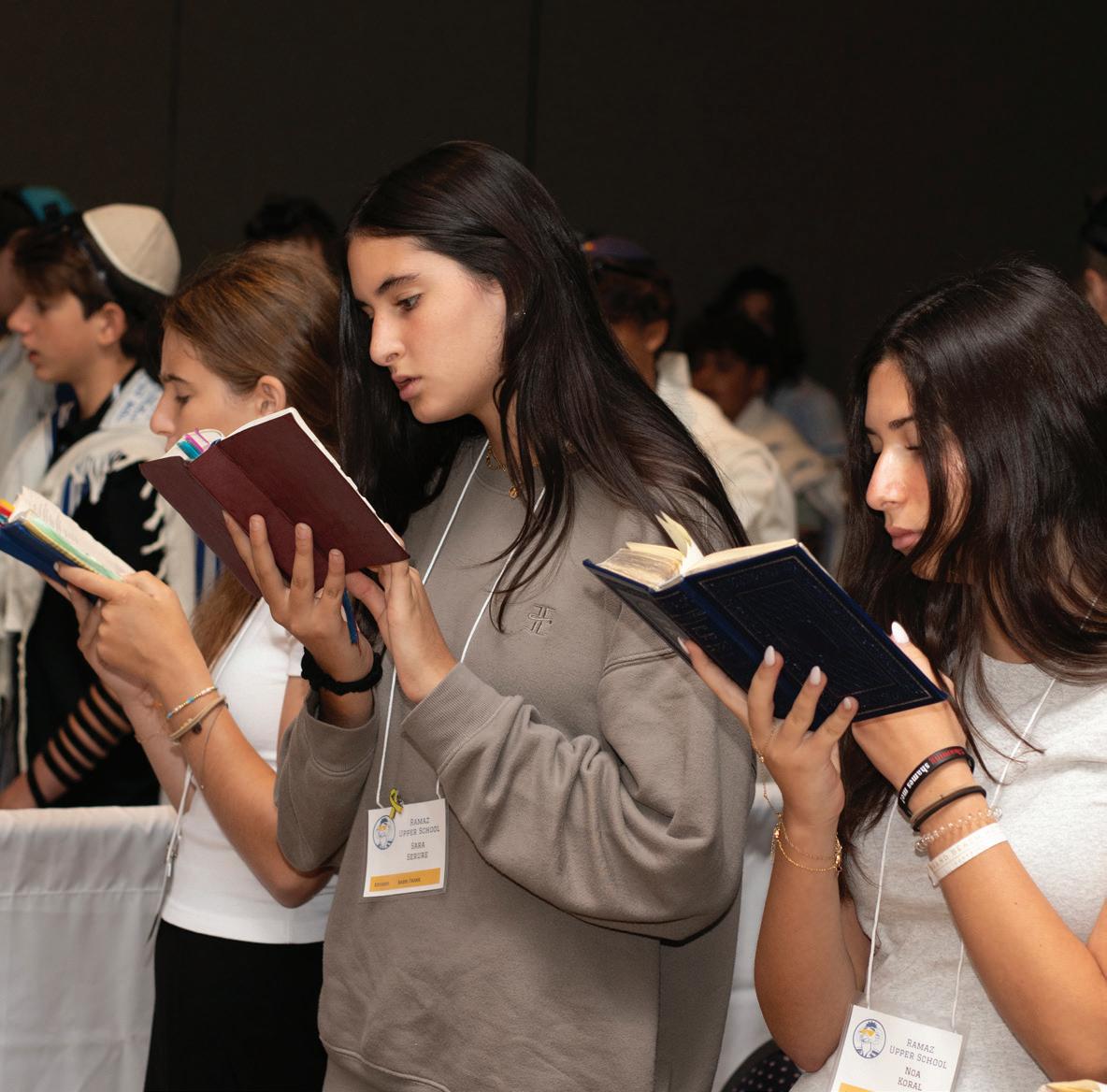
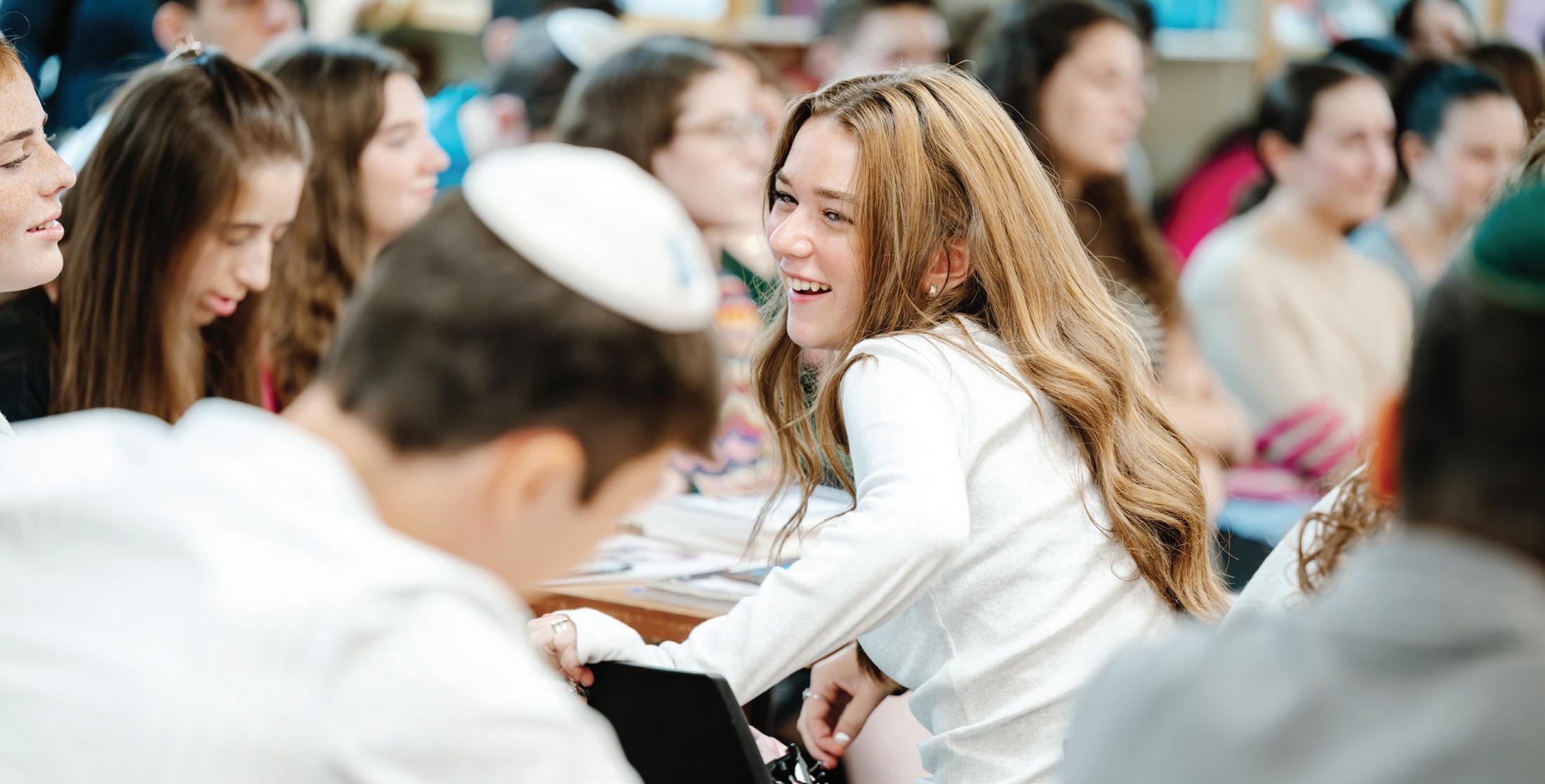
FOR ALL COURSES IN JUDAIC STUDIES, HEBREW IS THE PRIMARY LANGUAGE OF INSTRUCTION AND CONVERSATION. STUDENTS MUST SUBMIT ALL WRITTEN WORK IN HEBREW.
• To empower the students with the skills and knowledge necessary to understand the foundations of Judaism, including the system of halacha (Jewish Law) that is rooted in the Talmud as well as the foundational philosophical discussions that are developed in the Talmud
• To cultivate a love of learning and a spirit of Torah Lishma (non test driven study) that is rooted in the love for Torah, the enjoyment of the learning process, and the appreciation of its infinite value
The curriculum emphasizes textual skills, conceptual thinking, rigorous analysis, and the application of learning into practice. The curriculum is built around texts that are especially well suited to these goals, and are relevant to the religious and philosophical experience of the contemporary adolescent. The students learn directly from the t and use a custom workbook created by our Head of the Talmud Department, Rabbi Kenny Schiowitz.
• 9th and 10th grades: The focus here is on halachic discussions and debates related to topics relevant to the students. We study Masechtot Berachot, Pesachim and Kiddushuin, which includes topics such as Tefilah (prayer), kibud av v’em (respect for parents) and the laws and customs of the Pesach Seder. In addition to the conversive and analytical component of Talmud class, significant time is devoted to building and honing the students’ foundational talmud skills (reading, translating, etc.) in these grades.
• 11th grade: The focus this year is on ethical topics that are addressed by the Talmud (Masechet Sanhedrin), including reliability and truthfulness of witnesses, questions of human life. In the 11th
grade we commit a significant amount of time in the research of topics that are chosen by students. They identify, research, and analyze sources that address their personal questions. This research culminates in a presentation by each student to their classmates.
• 12th Grade: In 12th grade the department offers an array of courses that enables students to choose their focus. Some courses are Talmud text based and study various masechtot, while others focus on the general process of halachic development or on particular themes that transcend individual masechtot.
• The courses are tracked between honors, accelerated and regular levels. There is usually one honors section, two accelerated sections, and three regular sections.
• Matmidim: In 10 12th grades we offer a special section of Talmud for students who are looking for a more intensive and advanced learning opportunity. The class meets for additional periods each week, includes additional independent learning, and provides for a smaller, more focused learning experience.
• Mechina: Mechina is designed for students who are looking to enter into a yeshiva in 9th grade with a limited Judaic Studies background. During 9th grade they are offered special class that are designed to enable them to join the regular Judaic Studies classes by 10th grade. Mechina classes focus on fundamentals concepts and skills in Talmud and Tanakh that best prepare them for our textual classes in 10th grade.
• Students take advantage of the countless learning opportunities outside of the formal classrooms, furthering the mission of torah l’shma. Mishmar meets every day before and after school, and students can choose from different teachers and topics that interest them.
• Many of our teachers have established chavruta (study partners) learning with individual students during lunch breaks or free periods, and many meet on zoom later at night and throughout the summer.
• Additionally, we have a very active “DeBate Din” (Mock Beit Din) club that researches and debates cases of Jewish Law, and competes with other schools, as well as our Torah Bowl team.
Objective:
The Ramaz Tanakh department educates students toward an immense love of Torah and Torah learning, religious growth, advancement in skills and critical thinking, and content mastery of Tanakh.
9th Grade: The freshman Torah curriculum focuses on תישארב רפס (Book of Genesis) and emphasizes character analysis, relationships, contexts and conversations with an eye to the complexities of human nature and what it means to develop and grow as a person.
10th Grade: Sophomore year introduces the students to the methodologies of different commentaries for independent study of Torah, along with sensitivity to the biblical text and its philosophical interpretations.
11th Grade: Junior year raises the level to more sophisticated literary and theological analysis, mining the text for its interdisciplinary nuance.
The stories in Tanakh are jumping off points for conversations in the classroom about all sorts of topics. Classroom conversations stimulate students to reflect on their own experiences with leadership, influence, restraint and faith. The 9th grade Navi curriculum is entitled “The Navi and the King: Speaking Truth to Power” and covers stories about the abuse of power and the balance of power in the Ancient Near East. Students dissect the personalities and actions of Dovid and Natan Hanavi, and analyze the stories of Eliyahu Hanavi and his relationship with King Achav.

To engage the students in a safe and controlled environment to ask questions and think deeply about some of Judaism’s most fundamental halachot and values. Here discourse to understand is the classroom style.
The JLT Department seeks to complement the Talmud and Tanakh departments by focusing on additional important areas of Torah that may not be covered in the Masechtot and books of Tanakh that are taught in the school. Each year has a unique curricular focus.
9th Grade: This course is focused on tefilah (prayer) and studies the philosophical underpinnings of prayer, the laws of prayer, and the meaning of the texts. Classes study the form as well as the focus of intent (kavana) during tefilah.
10th Grade: This course focuses on the laws and experiences of Shabbat. We split our time between learning about active commandments such as kiddush and the prohibitions on Shabbat. Students learn in an engaging manner the fundamental halachic concepts and their applications to modern life with an emphasis on personal experience and their position in the halakhic process.
11th Grade: This course focuses on Jewish philosophy, including the purpose of the mitzvot, the foundations of faith, and theodicy.
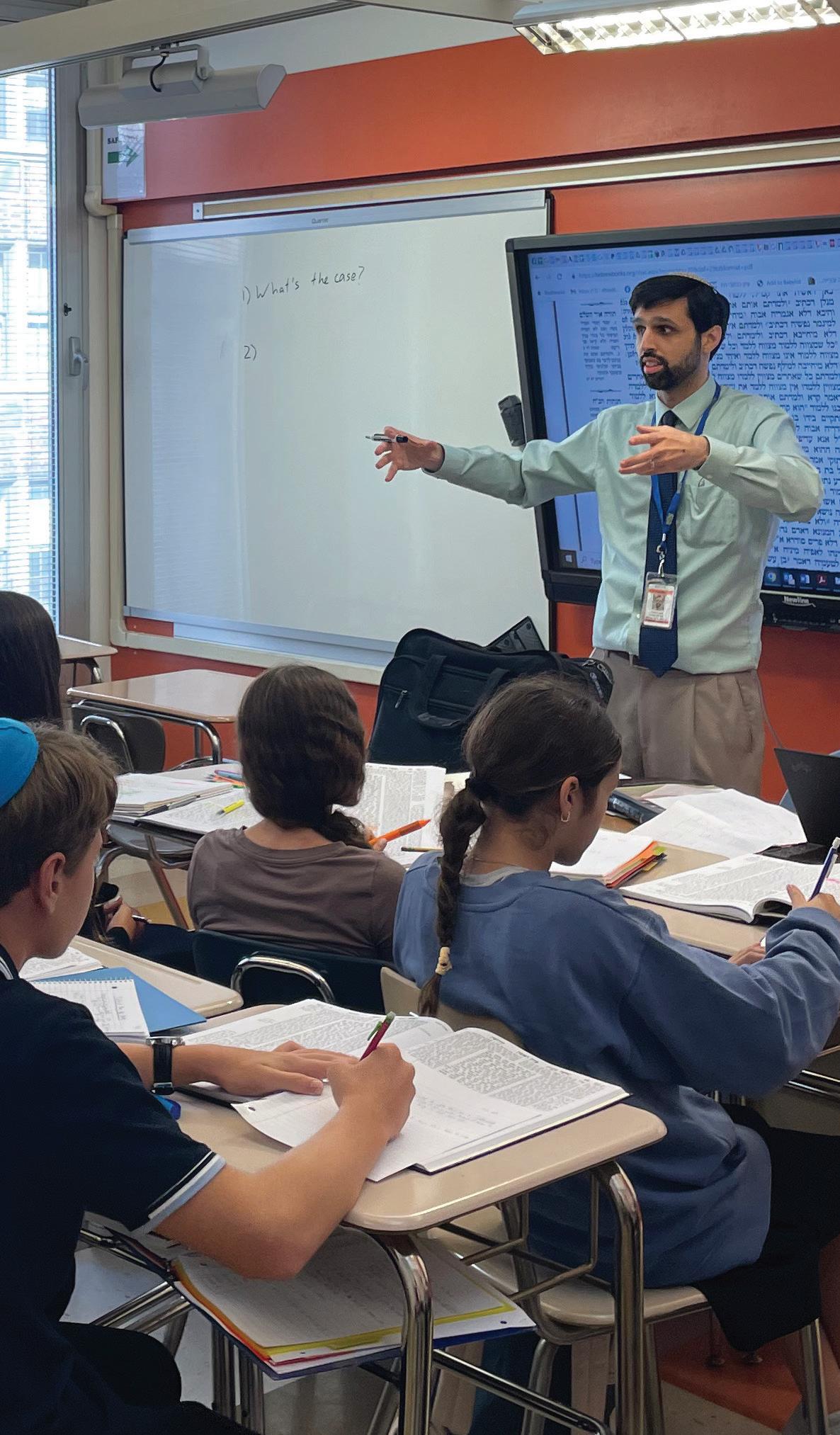
The department’s mission is to enrich and enhance the students’ knowledge of, connection to, and love of Israeli culture and society, history, and politics through developing their understanding and communicative abilities in the Hebrew language. Understanding and communicating in Hebrew is their key to access so much of their heritage and Jewish identity.
The Hebrew Language department encompasses much more than just language. The Hebrew Language courses and curriculum are structured in a way that strengthen and enhance the students’ identity. They explore Israeli poetry and media, culture, society, and government.
In the Hebrew department, our curriculum includes Israeli history, language skills, and modern Hebrew literature. Each grade is divided into six levels and each is taught a similar curriculum, adapted to the students’ level.
At the end of each grade students’ are proficient at the following levels:
9th Grade:
• Basic to intermediate Hebrew grammar
• Expressing themselves on topics including identity, connection to family, Israeli geography, and Hatikvah
10th Grade:
• Intermediate to advanced Hebrew grammar
• Expressing themselves on topics including detailed Israeli geography, literature and history about Aliyah and absorption into Israeli society from 1948 to the present day, as well as Israeli artists and their works.
11th Grade:
• Complex Hebrew grammar
• Express themselves both orally and written on more complicated topics such including contrasting aspects of identity, the Israeli wars between 1967 1973, the cultural and societal discourse that arose as a response to those wars, with reference and connection to current events in Israel.
• Discuss changes that they want to bring to the world as part of a culminating Tikkun Olam project
In an 11th grade unit commemorating the 50th anniversary of the Yom Kippur War, students listened to a video made by a former Israeli pilot. He spoke directly to them, in Hebrew, about his personal experiences and reflective insights about this war. The students engaged by responding and analyzing the pilot’s speech with their own reflections. Not only were their comments clearly expressed in Hebrew, they were thoughtful, deep, and mature. This project reflects the role Hebrew language plays in the Ramaz education deepening the students’ proficiency as well as their connection to Israeli society and history.
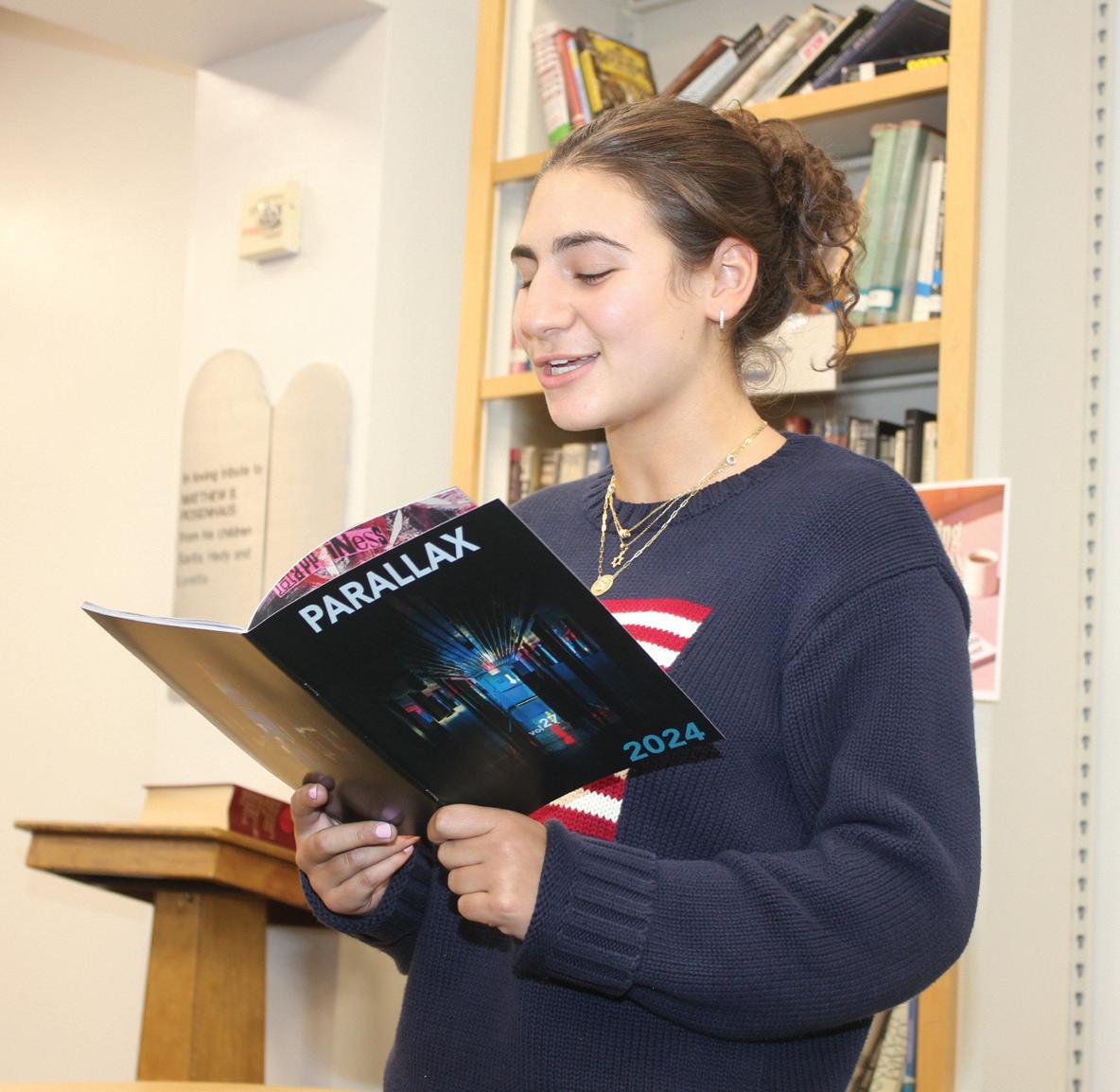
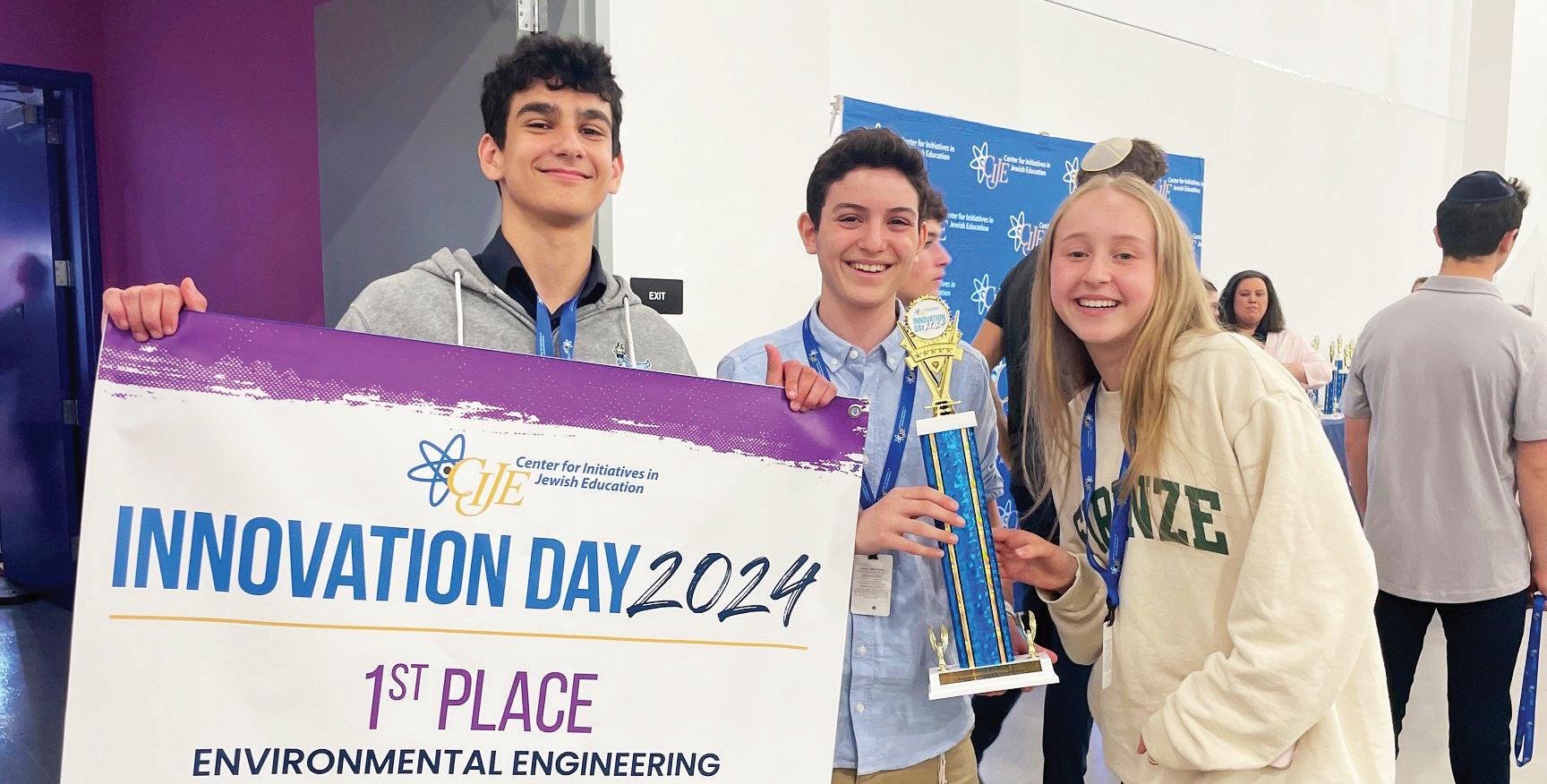
A Ramaz graduate is a proficient reader and interpreter of texts, a compelling and creative writer, and a master of the history of literature and literary devices. Ramaz English courses are mission driven to inculcate a love of reading and of intellectual inquiry beyond the classroom.
9th Grade: World Literature & Fundamentals of Essay Writing
• Burns, Catherine, Editor, The Moth Presents All These Wonders: True Stories About Facing the Unknown (selections)
• Poetry and short stories (other sources)
• Roth, Philip, Goodbye, Columbus
• Sophocles, Antigone
• Homer, The Odyssey
• Shakespeare, William, A Midsummer Night’s Dream
10th Grade: English Literature & Elaborated Essay Writing
• Beowulf (a 10th century epic poem of hero and monster)
• Selections from Geoffrey Chaucer’s The Canterbury Tales (it’s funny; it’s very old)
• William Shakespeare, Macbeth (witches, murder, ghosts)
• James Joyce, Dubliners (beautiful Irish short stories that will change your life)
• George Orwell, 1984 (a dystopian nightmare)
• Survey of British poetry (love poems, death poems, war poems; from Shakespeare to WW1)
11th Grade: American Literature & Complex Essay Writing
• James, Percival Everett (summer)
• “Rip Van Winkle,” Washington Irving
• Assorted American poetry of the 18th century
• “Young Goodman Brown,” Nathaniel Hawthorne
• “Bartleby the Scrivener,” Herman Melville
• Hamlet, William Shakespeare
• The Great Gatsby, F. Scott Fitzgerald
• Death of a Salesman, Arthur Miller
• Assorted American poetry of the 19th and 20th centuries
The English classroom is brought to life all around our New York City campus. Students go to live theater performances, hear from authors and speakers, and visit exhibits that relate to their texts. After school, there are also myriad opportunities for students to cultivate their writing and literary skills, including magazines, newspapers, creative writing, book clubs, and more.
Students participate in the annual Shakespeare Competition run by the English Speaking Union.
Ramaz students participate in many competitions and conferences each year. Parallax, our literary art magazine, has earned the highest awards given by Columbia University’s Scholastic Press Association each year. Our annual yearbook has been recognized as well each year, earning awards for its creativity in theme and design, superior execution of editorial objectives, and overall stellar content. These publications are student run, giving the students more opportunity to delve deeper into their personal interests and passions.
Our students have earned the highest awards on the state level from the Scholastic Awards competition in every category of creative writing.
Individual students displaying are encouraged and mentored to further develop their extreme passion and skill in the English subject. As an example, a junior student earned numerous national awards in playwriting. His plays have been performed by professional theater companies around the country, and one of them, “Lox,” is currently being made into a short film.
• At the heart of the school’s educational mission, the History Curriculum provides our students with an integrated perspective geared towards understanding the unique relationship between the Jews and the modern world.
• Ramaz students graduate with:
• An understanding of the richness of our history in a way that helps them better discern how our society has evolved in all its complexity.
• An appreciation of the history and civic structures of the United States and of the Jewish people, how those two threads intertwine and impact one another, not just in our past but in present times as well.
• A confidence to articulate their opinions, respectfully debate their peers, and thoughtfully evaluate differing perspectives, both in the classroom and the world around them.
• The skills to read and understand scholarly and primary sources, and analyze artifacts and images, to research and write about topics in history.
The history curriculum is an intentional three year arc that uniquely studies cross continental histories each year, giving students a full and comprehensive understanding of what was happening world wide during each time period and the impact of the Western World on the Jewish people. A significant sequence is devoted to the struggle to achieve Jewish statehood, the emergence of the State of Israel, and the evolution of Israel since its statehood. Through classroom discussions, lectures, analysis of primary sources, and the assignment of individual research papers, the history curriculum imparts an appreciation of political, economic, social, and intellectual history. Pioneered at Ramaz, this curriculum has been adopted by the Board of Jewish Education for use in other Jewish Day Schools.
9th Grade: Students in ninth grade begin their studies in sixteenth century Europe and conclude with the American Reform Movements of the mid 19th century.
10th Grade: The 10th grade curriculum picks up after the American reform movements in the mid 19th century, and goes through the history of the United States, Europe and the Middle East until the turn of the century.
11th Grade: The 11th grade curriculum starts from 1900, across all the continents, and concludes in post Cold War America.
Students have ample opportunity to explore cross disciplinary interests connected to their
history studies. Class visits to the Metropolitan Museum of Art to look at American paintings and discuss portraits of war heroes learned about in the classroom, explorations to Ellis Island during the 10th grade unit on Immigration to analyze primary sources and explore artifacts, and excursions to the Museum of Jewish Heritage to see first hand accounts of stories learned during the 11th grade curriculum.
The Math Department’s mission is to engage in the teaching and learning of mathematics that will challenge each individual student to be an independent learner and develop sound reasoning, problem solving, and critical thinking skills. This goal is accomplished through offering a wide variety of courses on each grade level, by keeping classes small enough to allow for individual attention, and by making available opportunities for customization of the curriculum, both remedial and enrichment.
Every student is required to take math all four years of high school. However, no two students’ trajectories are the same because of the individualized programming for each level of learner. Given the number of tracks, the Math Department has carefully constructed a curriculum so that each student progresses through the standard high school courses of geometry, Algebra II, and for most, Precalculus and Calculus courses. In addition to the standard curriculum, students have the opportunity to enroll in more advanced courses in Multivariable Calculus, AP Statistics and Linear Algebra. Moreover, specialty courses have been offered in Analysis, Differential equations and Complex Variables to eligible students.
9th Grade: Logic and Geometry
10th Grade: Algebra II
11th Grade: Precalculus
A peak into a math class at the Ramaz Upper School can look many different ways. You might find 2 students with a teacher or 15 learning together. You might see geometric shapes and logic proofs being worked on, or complex differentiated equations being extracted on the smart board. You might see a teacher offering extra work on a remedial level, and you might see a college professor offering a private course to distinguished students. What remains constant in the Math classroom, though, is that every student is challenged to push the boundaries of their mathematical and problem solving skills.
The Ramaz Upper School Science department’s goals are to foster an appreciation for science and a continuing curiosity about the natural world, impart a comprehensive knowledge of the major sciences, and to engage and excite students through interactive lessons, visual demonstrations, and laboratory activities.
A Ramaz graduate will be proficient in data analysis, graphing, and analyzing trends. They are able to articulate and present scientific ideas, and discuss these ideas in a critical and logical fashion. They will be able to evaluate scientific claims and make data based decisions.
The Science Department offers individually tracked courses for students, allowing each student to be challenged properly in the different science subjects. The science curriculum at Ramaz begins with biology in 9th grade, chemistry in 10th grade, and physics in 11th grade. In 12th grade there are a variety of science electives, including environmental science, astronomy, “Blood Guts, & Judaism” which explores biology as it relates to halakhah, as well as honors seminars in biology, chemistry, and physics.
9th Grade: Biology
10th Grade: Chemistry
11th Grade: Physics
The Science Department takes full advantage of being in New York City andusing our building to explore real life physics and phenomena. Our students look forward to the annual Force and Mass experiment in which they manually push a car down 78th street, discovering the impact of force on mass. Visits to the Planetarium and Museum of Natural History, experiments in the DNA Lab at Cold Spring, and field trips to the Newtown Creek Wastewater Treatment Plant as part of the Environmental Science curriculum all help to bring to life what the students are learning.
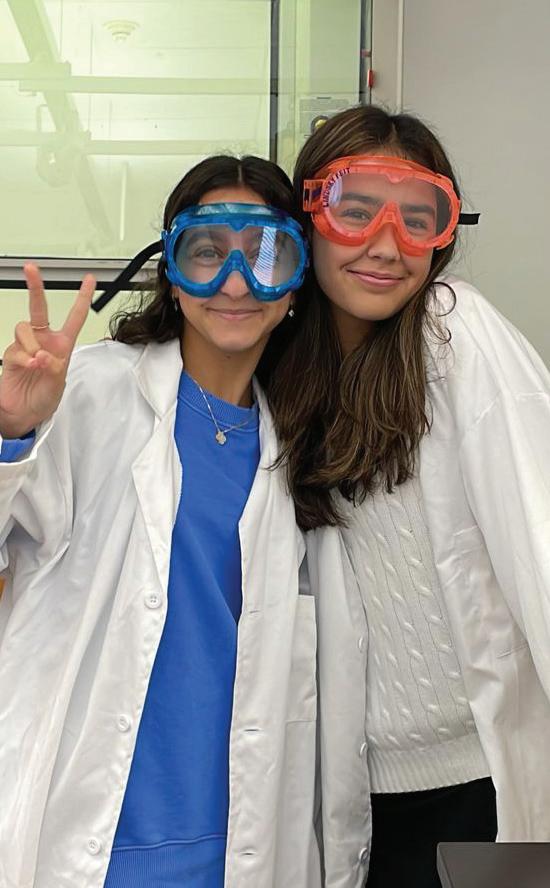
The World Languages Department enhances students’ well roundedness, sharpens their pursuit of knowledge, and complements their intellectual curiosity. The department teaches the benefits and importance of learning a new language and becoming familiar with its culture, traditions, and communities. Taught by heritage speakers, students learn to communicate fluently in French or Spanish and appreciate the culture of their chosen language.
Students are offered a choice of French or Spanish as their World Language. Students that are interested in, or already studying a different language, can request special accommodations and they are often met.
Students are required to take a World Language class in both ninth and tenth grade.
9th Grade: The focus here is on the fundamentals of the spoken language. Reading and writing skills are also taught by building a base of everyday vocabu lary and developing the necessary grammatical skills.
10th Grade: The focus here is on mastering more complex concepts of the spoken and written lan guage and an increased appreciation of the native speaking cultures and countries.
Students have the option in 11th grade to progress into an advanced class, but it is not required.
Students visit Spanish Harlem and the MET as part of their Spanish Program. They attend theater productions of Don Quixote and travel to the Hispanic Society to see the rare books collection.
French students walk to the MET and MoMa periodically to see exhibits on Manet and Degas and Picasso. This exposes them not just to the French culture component, but compliments their studies in Art and History as well.
Students have had the opportunity to view French and Spanish Bibles on display at the Morgan Library.
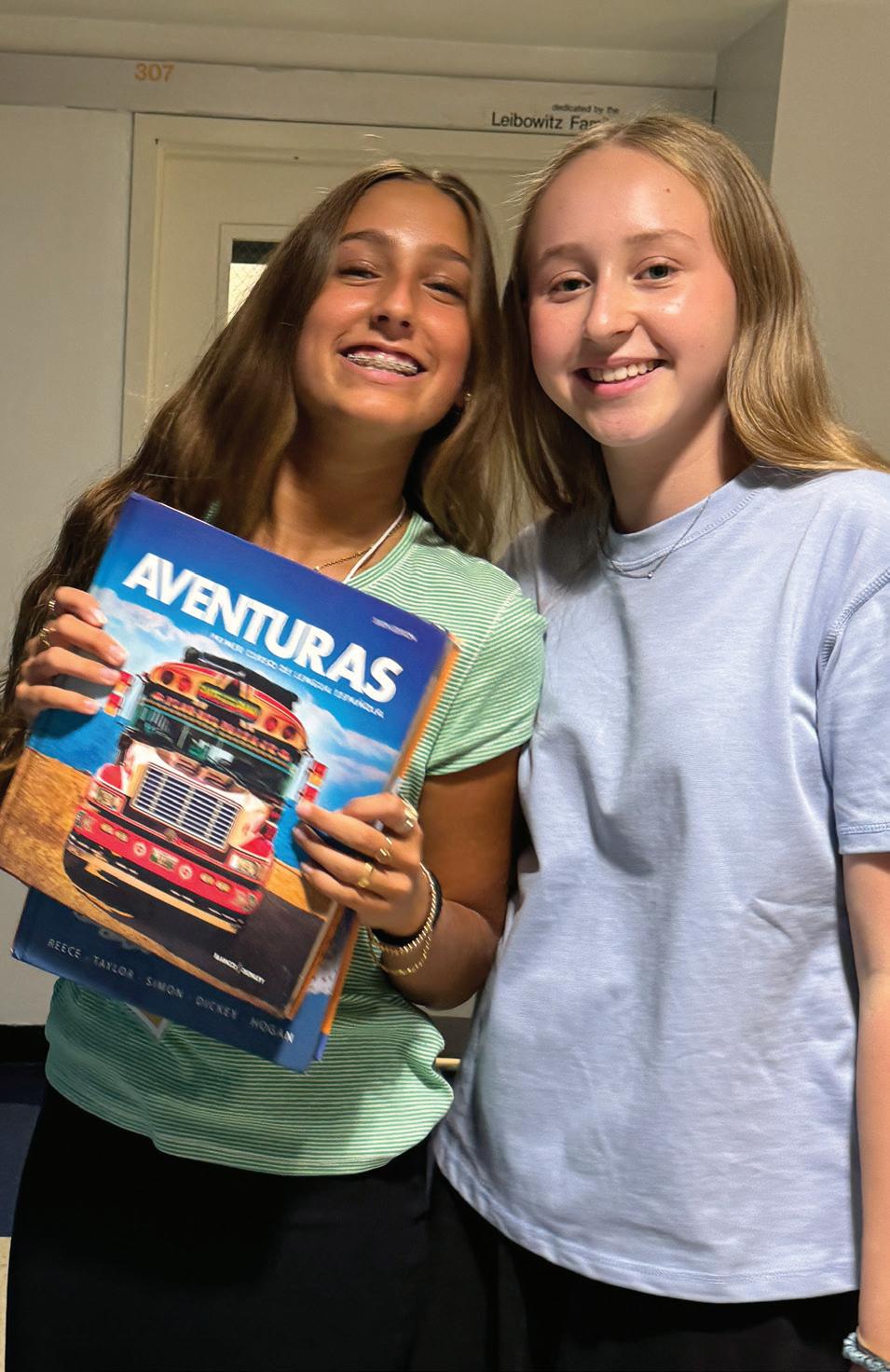
The goal of the Music Department is to inspire and encourage all students to develop their own aesthetic awareness of, and connection to, music as a form of human expression through the art of listening. As a piece of the core curriculum, Ramaz believes the well roundedness of students is an integral piece of developing them in full throughout high school.
OVERVIEW
The two semester “Magic of Music” course is designed for all students those who listen, those who create, those who perform, and those who have yet to discover. In The Magic of Music, students explore the two seemingly dissonant components of music, the formal design, or the objective structure of a musical piece, with the creative aspect, or the subjective and personal aesthetics of what and how they hear.
Objectives:
9th Grade: An introduction to the concepts of Sound, Rhythm and Melody through pieces by Brahms, Chopin, Copland, Britten and Verdi. Class room discussions of Dynamics and Tempo, and a class session on the Symphony Orchestra, the instrument sections within it and each instrument of a section.
10th Grades: Through the study of pop song form, primarily in the Rock & Roll genre of the latter 20th Century, students will be able to open their aware ness up to the structural templates of music far beyond a two minute song. Songs by the Beatles, Bob Dylan, Queen, R.E.M, Franz Schubert and more are studied, and connections will be made to the Art Songs of the early 19th Century, particularly through Schubert’s eerie song “The Erlking.”
All 9th and 10th graders take both art and music as a requirement. Through visual arts students gain confidence and the skills to express themselves with creative freedom. They become proficient in thinking visually and conceptually, while exploring and expressing their world through experimentation using a variety of materials.
9th Grade: The focus is on drawing and seeing using the most basic of mediums to create. The semester culminates with a stop motion animation project.
10th Grade: The focus is on design and color. Paint is the primary tool along with a weekly assignment viewing Abstract: The Art of Design series highlight ing artists in the varied field of design.
Being in New York City is a gift to an artist and art student. We frequently visit museums and galler ies all around the city, including the Metropolitan Museum of Art, The Frick Collection, The Guggen heim, MoMA, The Neue Gallery. When a small exhibit opens on the Upper East Side, our classes can simply walk over and explore, all within the time of a single period.
SENIOR YEAR ACADEMIC PROGRAM
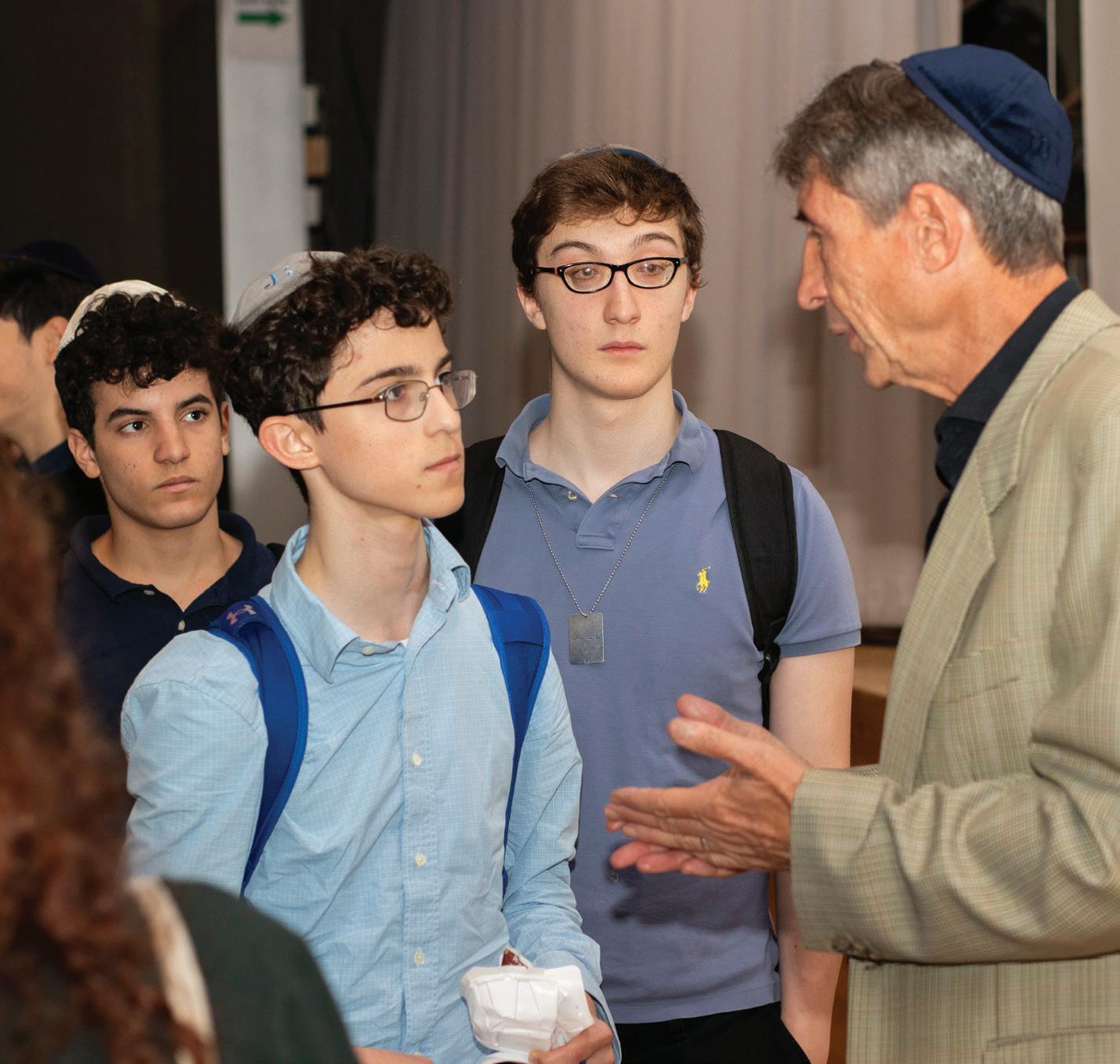
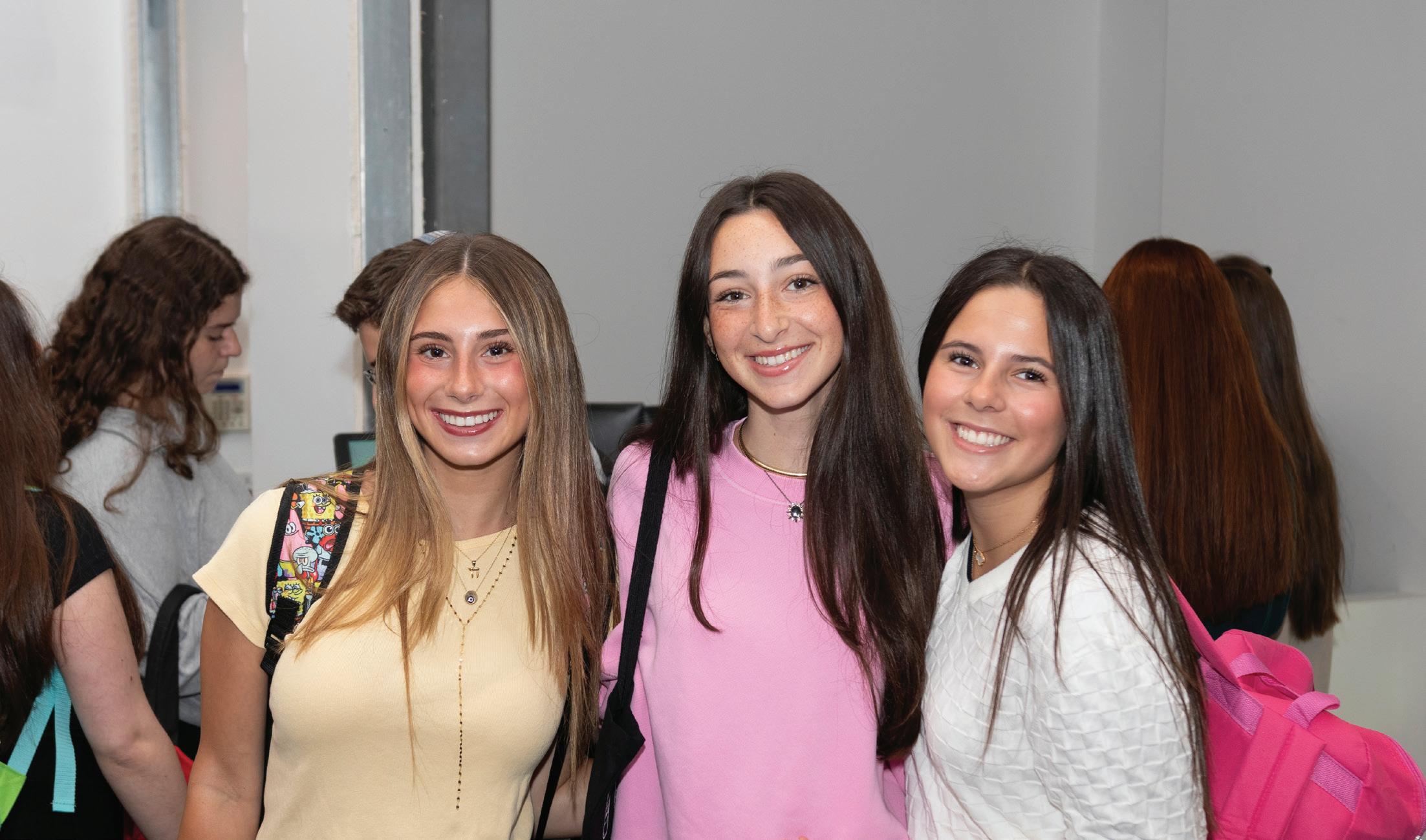
FOR ALL COURSES IN JUDAIC STUDIES, HEBREW IS THE PRIMARY LANGUAGE OF INSTRUCTION AND CONVERSATION. STUDENTS MUST SUBMIT ALL WRITTEN WORK IN HEBREW.
Ghetto Film School
In this visual storytelling, course participants receive more than 140 hours of immersive, college level training over the next year.
Creative instruction is led by Ghetto Film School alumni and guest partners. The lesson plan will cover both the art and business of media with multimodal communication, design thinking, storytelling, visual production and film making training. Students are expected to collaborate, digest and interpret the different forms of communication (e.g. text, audio, imagery, color).
The Program features instruction from leading creative artists and industry experts.
An application, creative submission and instructor approval required.
Ms. Abramson
HSS: Music Theory
The course is designed for students who want to explore more deeply how tonal music works. Previous music experience (instrumental or vocal) is beneficial but not essential. We begin with the study of keys, time signatures, intervals, chords and melody writing. We develop listening skills, sight singing, harmony writing, and formal analysis related to major and minor tonality.
Mr. Henkin
HSS: Studio Art
Honors Studio Art is an intensive course of self discovery through the creative process. We will follow the Studio Art AP structure which centers around building a sustained investigation a deep dive into a year long series of personal works.
There will be class assignments to inspire independent and personal explorations. Being receptive to input and critique is essential to learning and growing; we will engage in these conversations regularly.
The course meets 5x a week with the expectation of working in the studio outside of class time. This is a supportive and rigorous creative journey that requires initiative, independence and commitment. The year culminates in students exhibiting their work at Celebration of the Arts and will have the option to submit the AP Studio Art portfolio in May.
A portfolio, Q&A and teacher approval is required.
Ms. Abramson
Environmental Literature
Do we write the world or does the world write us?
This class will examine American fiction, nonfiction, and poetry through a consideration of place. We will explore how writers have depicted nature, what constitutes the natural world, and how economy, culture, and environmental concerns shape the ways in which we relate to the land. As a place based course, special attention will also be given to our particular relationship to the natural world in New York. As a multi genre course, students should also expect to spend time outdoors themselves, write about their relationship to place, and produce an original almanac with a group of peers. Writers studied will include Henry David Thoreau; Aldo Leopold; John McPhee; Wendell Berry; Scott Momaday; and Robert Macfarlane, among other poets, scientists, historians, and essayists.
Mr. Prehn
We will examine some of the “greatest hits” of American literature to explore the consequences of groups, families, and individuals crossing physical and metaphorical borders through dislocation, migration and estrangement. The literature will examine the displacement of Africans to the Americas, the migration of war refugees, and the resettlement of Native Americans forced to leave their tribal lands. The texts also explore individuals who violate established boundaries within the nuclear family; cross borders that separate them from other races, religions, and nationalities; or reconfigure the boundaries that define the self. Finally, we will examine metafiction, in which the author violates the traditional boundaries defining the relationship between reader and writer.
Ms. Litwack
This course will examine the trajectory of the Jewish/American experience through the lens of great literature: novels, essays, short stories, poetry and drama. The writers studied come from varied backgrounds, both secular and observant, but what links them together is the willingness to confront the essential dilemmas of the Diaspora experience. They have been fearless and inventive in attempting to understand and describe their own precarious, troubling, fascinating, and joyful situations as Jews in America. These writers have tried to answer the essential questions of the Jewish/ American experience: How does one meld into the American milieu, accept and believe in the American dream, while still retaining the historical, emotional connection to one’s own disquieting past? What is the cost of assimilation? What are the consequences of prosperity? The issues of anti Semitism, inter
marriage, sex, faith, and secularism are apparent in these works, and will be investigated.
Dr. Milowitz
Propaganda and Literature: Russian Literature
Propaganda and Literature introduces students to the literature produced in the totalitarian regime of the Soviet Union. To anchor the themes of morality, state power, propaganda, and free will, we will explore political essays and fiction written by diverse writers. We will also examine propaganda art and literature produced in the West with the goal of examining the necessary political conditions and social movements that allow propaganda to thrive.
Dr. Lekht
Shakespeare
“All the world’s a stage,/ And all the men and women merely players./ They have their exits and their entrances.” Enter the world of Shakespeare, a world peopled by complex and exciting personalities. We will examine the genres of tragedy and comedy and study several plays closely in terms of dramaturgy, character, theme, and language.
Because these are plays, we will attempt to attend a live production and/or view film. Shakespeare’s poetry will not be neglected: each play will be introduced by a complementary sonnet.
Course requirements will include acting scenes and writing essays.
Syllabus: Richard III (summer reading), Romeo and Juliet, Much Ado About Nothing, Othello, Sonnets
Dr. Honig
This class will begin with the radical changes taking place in the mid nineteenth century when the perfect wife Nora Helmer slams the door, leaving her husband and children behind in Ibsen’s A Doll’s House and travel through the structural, thematic, and psychological shifts that define modern drama. Playwrights studied include August Strindberg, Anton Chekhov, Eugene O’Neill, Samuel Beckett, Tennessee Williams, Edward Albee, and Harold Pinter. In addition to tackling literary analysis, students will have the opportunity to perform scenes from the plays.
Ms. Litwack
III. Hebrew Department
Israeli Society Through Film (Hebrew)
The course will focus on films, documentaries, short dramas and television series containing a variety of periods in Israel, reflecting Israeli society and its cultures. An introduction will be presented and discussed before each viewing. Following the film, a discussion will be held regarding the content of the film and the issues it raises.
Ms. Sole
Revolutionary Figures in Israeli Society (Hebrew)
This course explores the lives, influences, and legacies of key revolutionary figures who have shaped Israeli culture from its years as a new country to the present day. The course will offer lectures, readings, class discussions, short films, and other media sources. Students will learn about contributions of pioneers in literature, music, politics, and art in Israel. The course will cover iconic political figures such as David Ben Gurion, Golda Meir, and Yitzhak Rabin.
It will also cover major figures such the writer Shai Agnon, Naomi Shemer (poet), and Amos Oz. Students will examine how these figures reflected and influenced societal values and political landscapes, helping to create a unique Israeli identity. Each week, we will focus on different individuals, analyzing their works, ideas, and the historical contexts of their contributions. This course is ideal for anyone interested in understanding the cultural fabric of modern Israel.
Ms. Ohayon
IV. History Department
AP Microeconomics
This college level course is equivalent to the first semester of economics offered in college. Microeconomics covers basic economic concepts, product markets (supply and demand), firm behavior and market structure (perfect competition, monopolies, etc.), factor markets, consumer choice, and market failures. This course requires strong analytical skills regarding graphs. Recommendation from your math teacher is required. Students are required to sit for the AP exam at the completion of this course.
Ms. Lowry
History of Capitalism
Through close reading of primary and secondary texts, this course examines how capitalism has been considered, defended, and criticized over the last several centuries. Students will also have opportunities to explore contemporary events through the lens of the course.
Dr. Lerer
This course will provide an exploration of the complex dynamics, histories, and contemporary issues of the Modern Middle East. Utilizing a combination of primary and secondary sources, students will delve into the region’s rich tapestry of cultures, religions, politics, and societies, gaining a deeper understanding of its evolution and current challenges.
The course begins by examining the historical roots of the Modern Middle East, from the decline of the Ottoman Empire to the colonial and post colonial periods, including the impact of World War I and the establishment of nation states. Through primary sources such as historical documents, memoirs, and literature, students will analyze key events and perspectives that have shaped the region. The course will explore significant political, social, and economic transformations in the region during the 20th and 21st centuries. This includes the rise of nationalism, the Arab Israeli conflict, the emergence of oil economies, and the influence of external powers.
Dr. Herzog
This course is intended to provide students with a comprehensive, college level introduction to the study of art from 8,000 BCE to the present day. In so doing, students will complement their previous study of history by focusing on why and how human beings from virtually every culture, regardless of when or where, have felt the need to express themselves and elements of their daily lives, through “”visual culture”” from media ranging from painting, sculpture, architecture, film, and so on, through material objects and ephemera that may or may not have dedicated
functions other than the decorative. The central and key enduring questions that are addressed in this course include the following: What is art and how is it made? Why and how does art change? How do we describe our thinking about art? Through these essential questions, students uniquely explore the big ideas of Art History, effectively and precisely articulating an artwork’s meaning and function, the maker’s methodology, and the ways the work reflects and affects its historical and cultural context: from prehistory to the present day, from Europe, Asia, Africa, the Americas, the Pacific, and beyond. With these enduring questions as the foundation, the Art History course, which is organized into ten cultural and chronological units, emphasizes the daily practice of questioning techniques, methods of discussion, analytical paradigms, guided discovery, and independent learning. Since Ramaz students are lucky enough to live in New York City and have access to some of the most renowned art museums and galleries in the world, as well as access to a variety of professional curators, academics, and scholars, we will explore the art world (and the art “”market”” as such) as it exists today for an especially vibrant, deep, and intimate understanding.
Students will be evaluated through a combination of assessments modeled after sections of the AP exam (multiple choice, slide/image identification, short answer, comparative essays, etc.) student led discussions, and a curatorial project that will allow participants to show their own ways of seeing the world through the truth (if we believe Robert Browning) that the study of art allows.
In preparation for this adventure over the summer please familiarize yourself with the AP Art History list of 250 artworks.
Artworks: https://smarthistory.org/required works for ap/
Ms. Greengold
HSS: Consumer Society
This course explores the development of consumer culture from various historical and theoretical perspectives. It examines how consumerism evolved around the world from the early modern period to the present day. We will use historical case studies of commodities (like food, clothing, and art) as entry points to discuss broader cultural issues as well as different theories about the purpose and meaning of consumption. Students will also have opportunities to reflect on how consumer culture impacts their everyday life, personal identity, and values.
Dr. Lerer
HSS: Hebrew
This course provides advanced language practice through an introduction to Israeli culture. We will explore how Israeli culture was influenced by historical events (such as wars and social movements) and by the globally diverse groups in Israeli society: Mizrahi and Ashkenazi Jews, Arab Israelis/Israeli Palestinians, Orthodox and secular, immigrants and veterans, and more.
Students will explore Israelis’ creative expressions which have absorbed many different cultural and social influences: literature, song lyrics, essays, etc. and will understand the unique circumstances that influenced the development of Israeli musical and literary genres.
By departmental approval. This course meets the History requirement.
Mr. Adelman
HSS:
This course will survey the Zionist idea and consider how it has evolved over the past century. We will begin by looking at the various contrasting visions of Zionism, the ideological roots of Israeli culture, and how Israel’s founders interpreted these ideas in the nascent state. The founders had to grapple with the same questions that are still at the crux of understanding the complexity of Israeli identity today, such as: What does it mean for Israel to be a Jewish state? In what way does Israel define itself as a democratic state? What are the political and economic frameworks that the Israeli state should emulate? Using primary and secondary sources, we will examine these questions and analyze how Zionist thinking and events in Israel’s history shaped contemporary Israeli society and identity.
Dr. Herzog
Legend and Lore in Jewish
Lost tribes at the edge of the world, a shomer shabbos river, Moshiah hanging out among the downtrodden of Rome—Jewish history is awash with fascinating and surprising legends and lore. Much more than mere entertaining stories, these tales reflect and address many of the challenges Jews have faced as a dispersed and vulnerable minority. In this course, we will study a wide range of Jewish legends, learning how to read stories carefully, situating them in their larger cultural contexts, and exploring how they created meaning for their intended audiences. (Spoiler alert: students will be invited to craft their own version of a Jewish legend based on the texts read in class.)
Dr. Stein Kokin
Rock & Roll Cultures: Music, History, Society
This course explores the ages/eras of Rock & Roll music and adjacent forms of Pop music, the music’s impact on the culture of several generations, and the transformative possibilities of a pop song. From the 1950s to today decades of Rock/Pop music are explored, styles are discussed, artists, bands and albums are delved into. Other relevant genres of popular music will be touched upon as well, such as Rhythm & Blues, Hip Hop/Rap, Soul, Jazz and more. Along with the musical aesthetics of each style uncovered, the course also examines the societal impact and historical context of various strands of Rock & Roll through time on youth subcultures and the mass culture industry. Teenage perspectives over time will be covered, as well as those of young adults and indeed people of all ages. Examples of the male and female gaze as represented in the music and its history will be explored, as well topics of race, identity, and generational influence.
Intensive listening and viewing sessions will complement class discussions, projects and presentations, in an atmosphere aiming to foster critical thinking, open conversation, and...immersion in sound!
Mr. Elisha
Halakhic Process
This course will focus on the halahkic process providing students with in depth examination of some of the legal mechanisms used by the rabbis to legislate Jewish law along with heightened textual and conceptual complexity.
We will be learning the scope and power of rabbinic authority and types of rabbinic legislative activity, leniency within Jewish law. As well as exploring the roles of minhag, sevara, judicial independence, precedent in halakha. By the end of this course, the goal is for students to gain an understanding of the halakhic process and how laws are created and have changed over time.
We will also apply our learning to contemporary halakhic case studies including women and halakha, the creation of new holidays as well as laws that we don’t keep today.
Ms. Wilner
This course will be a comparative analysis of Western and Jewish philosophy. We will examine critical themes such as knowledge of God, free will, reward and punishment, love and sexuality. As an example of our approach, there will be a focus on the contrast between the dialogues of Plato and the biblical and midrashic narrative of the life of Avraham Avinu. We will explore the life of Socrates, his trial and ultimate acceptance of death as a contrasting model for Akedat Yitzhak.
What role does inspiration play in a person’s life? Through interviews and Jewish and general texts, this class will explore multiple obvious and non obvious sources of inspiration that one might encounter during their lifetime. The class will utilize reflection as a key tool in learning.
R. Lookstein
Jewish Activism
This course follows the development of Jewish activism in the US. It explores the nature of antisemitism in America, the American Jewry response during the Holocaust and shows the evolution of activism through the Soviet Jewry era, Israel and modern day post Oct 7th.
Dr. Block
Jewish Philosophy
In this course we will explore some of the “big questions of Judaism” such as Moshiach, the World to Come, Resurrection and Theodicy, and we will see the ways that Jewish thinking has evolved through our history.
R. Hakimian
Response to the Enlightenment: Mussar, Chasidut, and Hirschian Orthodoxy
Our study begins with development of the Jewish Enlightenment and the Reform movement which it produced, its consequences for the Jewish World, and the concurrent development of the dynamic Orthodox movements which still give direction and inspire our communities. We will get to know Moshe Mendelssohn, Rav Yisrael Salanter, Benjamin Disraeli, and the Ba’al Shem Tov, read texts, articles, and study films, ask a lot of questions, and perhaps find some answers!
R. Weiser
Shivat Tziyon: The Miracle of Modern Zionism
In this course we explore the longing and return of the Jewish people to לֵארׂשְִׂ
,from the Assyrian Exile to the Soviet Jewry movement and the Ethiopian return, with the idealism that drained the swamps
and won the Yom Kippur War, to our dealing with the treachery of the UN Zionism is Racism resolution and Hamas and Campus agitators. We’ll do this through readings (The Prime Ministers by Yehuda Avner), numerous articles, and film. There will be reading quizzes, short review assignments, and tests.
R. Weiser
Accelerated Calculus
This is a college level course in differential and integral calculus. Emphasis will be placed both on a conceptual understanding of the material as well as calculus applications. The course is less proof based than Honors Calculus and students will use calculus to understand and model real world situations. Graphing calculators are used where appropriate.
Department - Math
AP Calculus AB
This is a college level mathematics course that is equivalent to the first course in calculus offered in colleges. This course is intended for students who have a thorough knowledge of college preparatory mathematics, including algebra, geometry, trigonometry and properties of functions as studied in a precalculus course. Topics include: properties of elementary functions ¬ùalgebraic, trigonometric, exponential and logarithmic; limits; differential and integral calculus. The emphasis in this course is on problem solving.
Department - Math
AP Calculus BC
This college level course is equivalent to the first year of college calculus. All topics covered in AP Calculus AB are included here. Additional topics covered include: sequences and series, parametric equations, polar functions and differential equations. This course is considerably more rigorous and theoretical than the AP Calculus AB course.
Department - Math
AP Statistics
In colleges and universities, the number of students who take a statistics course is almost as large as the number of students who take a calculus course. At least one statistics course is required for majors in engineering, psychology, sociology, health science and business, to name a few. The purpose of this college level course is to introduce students to the major concepts and tools for collecting, analyzing, and drawing conclusions from data. A recommendation is required from your math teacher. Students are required to sit for the AP exam at the completion of this course.
Ms. Lowry
Applicable Math
In Applicable Math we explore the use of math in a variety of social science contexts: economics, finance, demographics, weather, sports, health, social justice, etc. This course will improve existing math skills and add new skills. The new skills will be drawn from pre calculus, probability, statistics and discrete math. This one semester course will prepare a student for taking a basic math requirement in college such as precalculus or quantitative methods (statistics).
Department - Math
Calculus
This course is modeled after a first course in calculus offered in colleges. This course is intended for students who have a working knowledge of college preparatory mathematics, including algebra, geometry, trigonometry and properties of functions as studied in a precalculus course. The focus is on differential and integral calculus of algebraic functions. The emphasis in this course is on conceptual understanding.
Department - Math
Honors Linear Algebra
This course is an introduction to linear algebra. The recent advances in Big Data and even more recent advances in machine learning have reignited interest in this long dormant discipline. Anyone who wants to delve into engineering, math, physics, computer science, economics, and finance should consider taking a course on this topic at some point in their career. What we are offering is similar to a college level intro course in linear algebra. The course will be structured into two semesters and students can elect to take the first semester only, or both semesters. The course doesn’t have any prerequisites beyond algebra 2 and trigonometry. The course develops in parallel with calculus and while calculus is not a requirement, it does allow students to investigate more advanced examples. A student who has mastered the rudiments of this discipline will be able to engage with the recent literature on neural networks etc.
Department - Math
HSS: Multivariable Calculus
This course is the third semester in the Honors Calculus sequence. The prerequisite for taking this course is AP Calculus BC. Topics covered are:
hyperbolic functions; vectors and the geometry of space; vector valued functions; functions of several variables; multiple integration; and vector analysis.
Mr. Klotz
Astronomy
This course is designed to introduce the students to the cosmos by exposing them to known facts, evolving ideas and frontier discoveries in astronomy today. The course covers the following topics: Earth and the solar system, stars, stellar evolution, the Milky Way and other galaxies and cosmology.
Mr. Klotz
Blood, Guts, & Judaism: Kashrut - Science & Law
This course will focus on science as found in the Torah and in Halakha. We will focus on animals for the first part of the course, looking at how species are identified as kosher and non kosher. We will focus on mammals, birds, fish, and insects and go through the anatomical signs that are provided and not provided to guide their identification. We will then learn about shechitta, going through the main laws, what is involved, related anatomy, and how to sharpen and check knives. We will also learn about methods of removing blood from raw meat. Finally, for the last part of the animal module we will study the laws of treifot and look at the anatomy of animal injuries and how that relates to the modern kosher meat industry.
The second part of the course will look at other nature related aspects of Judaism, including Tcheilet, safrut (specifically the materials involved and how they are made), chametz, and laws regarding plants. This course will be a mix of chavruta learning of texts, class time review and presentations, and hands on
demonstrations and labs. Be aware that this course will involve dissections and will also require the ability to read and understand Hebrew texts.
Mr. Goldberg
HSS: Biology
This course is the equivalent of an introductory college biology course. The course follows the AP curriculum and covers the following topics: chemistry of life, cell structure and function, cellular energetics, cell communication and cell cycle, heredity, gene expression and regulation, natural selection and ecology.
Texts: AP Edition Campbell Biology, 12th edition. The College Board, Biology Laboratory Manual, edition C.
Dr. Herman
HSS: Chemistry
This course is the equivalent of an introductory college chemistry course. Through classroom lessons and labs, it covers the following topics: atoms, molecules, stoichiometry, gas laws, atomic structures, bonding, solids and liquids, acids and bases, equilibria, thermodynamics, electrochemistry, an introduction to organic chemistry, and nuclear chemistry.
Texts: Zumdahl, Chemistry, 9th edition.
Ms. Brachot
HSS: Environmental Science
Environmental Science focuses on the interaction between humans and the natural world. We will study the natural environment focusing on ecology, earth science, geography, and geochemical cycles. Then we will look at what happens when eight billion humans in the modern age interact with the natural world. How do we feed everyone and provide enough clean
water? How do build cities and provide energy? And finally, how does all of this human activity affect the natural environment.
Dr. Rotenberg
HSS: Physics
This course is a college level, calculus based course designed to provide a foundation in physics for those students who plan to major in the physical sciences or engineering. Through class discussion and laboratory work, the course covers, in great depth, all aspects of mechanics and electromagnetism and stresses problem solving.
Text: Tipler, Physics, 5th edition.
Mr. Klotz
VIII. Talmud Department
Accelerated Talmud
Ownership and its discontents: Topics in Bava Kamma. What rights and responsibilities does ownership entail? How is ownership transferred? Are proprety rights the same as the boundaries of ethical behavior? We will explore these questions and more while continuing to practice our Talmudic textual and reasoning skills
Ms. Gedwiser
Aggadic Literature
Most would categorize Talmud in the legal genre, with good reason. However, most legal works do not have any passages explaining narrative or retelling stories that are only tangentially connected to the law. Why does the Talmud spend a substantial amount of time on aggadot ? In this course, we will study these fascinating stories and exegesis to understand what
are these stories? What are there messages? And lastly, why, in a complex world, aggadot are essential to the Talmudic project?
Ms. Wilner
Honors Talmud Matmidim - G5
Rabbi Teichman’s section will explore Jewish Law’s procedures of divorce discussed in Mesekhet Gittin. Instead of topical learning, this course will learn the Talmud in its consecutive order, focusing almost entirely on the Gemara alone with little commentary. Furthermore, this course will have significantly more opportunity for chavruta learning instead of frontal learning. Students in this course will learn more Talmudic topics at a quicker rate and focus on advancing their textual Talmudic skills.
R. Teichman
Honors Talmud Matmidim - J1
Kashrut is one of the most relevant parts of Jewish law to our lives, but also the least understood. In this course we will be diving into the world of Kashrut, starting with select topics in Gemara Chulin and working our way to the practical Halacha in the Shulchan Aruch as it applies to our everyday lives and the modern world. The course will be at once highly analytical as well practical and hands on. In addition, there will also be an additional out of class self study “ bekiyut ” component, complimenting the in class experience.
R. Schwartz
Honors Talmud Seminar
By studying fundamental topics in Tractate Bava Kama, this course will explore Jewish Law’s perspectives on tort. We will analyze the rights and responsibilities of ownership with discussions
addressing the balance of individual personal rights and responsibilities to the rest of society. In addition to the content, there will be a strong focus on advancing each student’s conceptual analysis skills and some focus on textual reading skills.
R. Teichman
IX. Tanakh Department
Accelerated Tanakh: Shir HaShirim
The focus of this curriculum is the study of םיִרישִַּׁה
with its depiction of the tumultuous relationship between the male and female lover on both a literal and allegorical level. This course delves into the ups and downs of their relationship, and how each of those failures and successes are a reflection of a deeper reality in our lives, whether it be the relationship between the Jews and God throughout history, the relationship of the Jewish individual with God, or that between a person’s body and soul. Along with a strong focus on textual and exegetical analysis, theological and philosophical issues such as emunah, the levels of one’s soul, and the different “languages” of our religious experiences will be comprehensively discussed.
Ms. Rahimzada
Bereishit Revisited
In this course we will go back to the beginning of the Torah, and of many of our Jewish educations: Sefer Bereshit. We will revisit both the familiar stories of Bereshit the ones you think you already know (creation, the flood, the Akedah) and the stories your earlier education may have skipped over (Sedom, Lot, Yehudah and Tamar). Our goal will be to understand the messages of the book of Bereshit
as a whole, and what it tells us about how to live as human beings and Jews.
Ms. Gedwiser
Honors Tanakh - Iyov (Book of Job):
Iyov is considered one of the most difficult books of the Bible on a textual and theological level. We will explore the age old question of theodicy (Good and Evil) and the religious response to suffering. Discussion about these difficult topics will help us understand the Jewish view on suffering through the ages, as well as developing practical views on these difficult subjects. By the end of this course, we will have touched on many of the countless themes of this Sefer and have tried to apply it to our own circumstances and world. We will explore the text and pay close attention to literary structure, grammar while strengthening reading, analysis, and translation skills. This careful analysis will help us unlock the rationale behind the meforshim and medrashim R. Ritholtz
Murder, Death, and the Value of a Life in Tanakh
Is there a ”good type” of murder? What is the punishment for killing in war? Isn’t ‘Thou Shall not Kill’ one of the 10 commandments? How do you get away with murder?
Since the beginning of time murder and killings have seemed to be inherent parts of our society. Using Tanakh as our lens we will explore how the Torah views murders as well as the place of murderers in law, psychology and society. We will be exploring many themes such as Retribution & Revenge, Love & Jealousy and Power & Fear. Through the analysis of both law and narrative, we
can gain a deeper understanding of our Jewish values as well as the text itself.
Ms. Benus
Parasha & Dvar Torah Workshop
In this course, we will learn the skills on how to research, write and deliver a dvar torah. Students will gain skills in textual analysis, critical thinking, writing drashot, and public speaking.
After learning and gaining skills in writing Divrei Torah, we will add the speaking component, where students will present their Divrei Torah to the class and get feedback on the ideas and their public speaking from their peers and their teacher.
We will explore Halachic ideas, philosophical messages and inspiration, and discuss and learn the best ways to get these messages across to different audiences. We will have the opportunity to learn and discuss different lifecycle events, and deliver divrei torah and bracha for those events. Students will be expected to learn how to give feedback and take feedback to sharpen their skills and work.”
Mr. Pianko
HSS: Computer Science
This course emphasizes programming methodology and procedural abstraction. It also includes the study of algorithms, data structures and data abstractions. A primary objective of this course is to teach students how to write logically structured, well documented, efficient computer programs. Java is the programming language that is used and taught
in this course. No prior programming experience is necessary.
Students are required to sit for the AP exam at the completion of this course.”
Mr. Ginsburg
TEC Capstone
Students propose, research, and develop a project which solves a problem. Projects may draw from all areas of technology including but not limited to software development, engineering, or design (2D or 3D). Collaboration is encouraged. Admission to this course is dependent upon approval based on previous course work and a short written application.
Mr. Aronson
AP Spanish
This is a college level course aimed at achieving a high level of proficiency in the spoken language and developing excellence in written skills. In this course you will enhance and develop your Spanish language skills and learn about the cultures in Spanish speaking parts of the world. You’ll practice communicating in Spanish and study real life materials such as newspaper articles, films, music, and books. Students must take the College Board AP exam at the completion of this course.
Dr. Roldan
Colloquium: Literary Spanish Studies
Conducted in Spanish. In depth study of Latin American periods and topics within a tradition.
Some of the topics are politics, sustainability, arts and aesthetics and global challenges. The course approach for learning is a project based model which introduces a wide variety of texts: readings, visual art, podcast, music, videos, and community work. The class will visit museums and different leaning platforms.
Dr. Roldan
French Culture and Language
We will discover the French “art de vivre”, including food, art, fashion, cinema, in France and other French speaking countries. We will study the influence French culture and language has around the world, through movies, music, literary texts, news, and school trips. YOU DO NOT NEED TO KNOW FRENCH TO ATTEND THIS CLASS. The assessment will be based on quizzes, projects, participation and in class presentations.
Ms. Maussion
HSS: French
This is a college level course aimed at achieving a high level of proficiency in the spoken language and developing excellence in written skills. Students will listen to radio programs and read both literary texts and newspapers to enhance their fluency. It follows the AP French curriculum. Students who have completed at least three years of French are eligible for acceptance to the course. Students are expected to take the AP exam at the completion of this course.
Ms. Maussion
